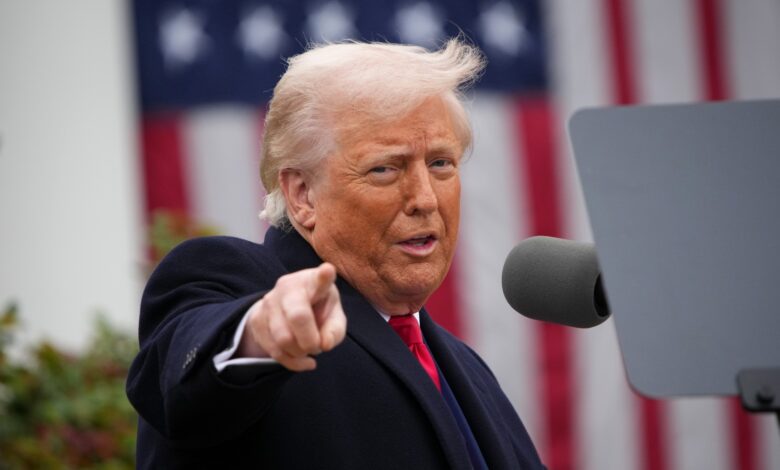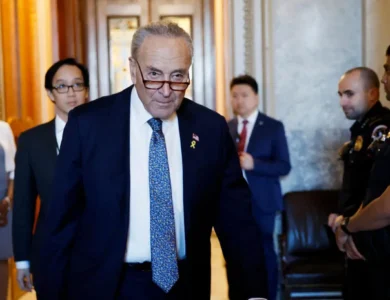Trump Admin Will Move Quickly To Roll Back Nationwide Court Injunctions

The newly confident Trump administration intends to vigorously contest judicial blocks against the president’s key initiatives, a White House official said following a significant Supreme Court decision that restricts federal judges’ authority to issue nationwide injunctions.
According to the official, who requested anonymity to discuss internal strategies, government lawyers will urge courts to swiftly narrow the scope of the numerous broad rulings that have impeded the administration’s agenda, the Washington Post reported.
Read more: Schumer Called Out For Ignoring Biden’s Mental Decline
Among the administration’s priorities are injunctions involving the Education Department, the Department of Government Efficiency, and a court order halting efforts to dismantle the U.S. Agency for International Development (USAID), the official added.
“Thanks to this decision, we can now promptly file to proceed with numerous policies that have been wrongly enjoined on a nationwide basis,” President Donald Trump said on Friday following the rulings.
On Friday, Trump described the reduction of judicial power as a significant and necessary correction in his ongoing struggle with select federal courts that has limited his authority.
Read more: NO DECISION – Supreme Court STUNS as Trump Justice LEAVES Case
“The Supreme Court has fundamentally reset the relationship between the federal courts and the executive branch,” Notre Dame Law School Professor Samuel Bray, who has studied nationwide injunctions, said in a statement, the Post reported. “Since the Obama administration, almost every major presidential initiative has been frozen by federal district courts issuing ‘universal injunctions.’”
Nationwide injunctions halt an action until a court determines its legality. Recently, they have become a common tactic used by opponents of presidential policies, often delaying the enforcement of executive orders for years, even if the court later upholds them.
Experts warn that the Supreme Court’s ruling may make it more challenging and complex to contest executive actions, potentially leading to a fragmented landscape of court decisions on presidential orders across different regions of the country, the Post said.
Read more: Patel, Bongino Publicly Expose FBI’s Hillary Clinton ‘Cover Up’
In the short term, the ruling represents a setback for liberals who have used the courts to block Trump’s policies. However, it could also limit conservatives seeking broad judicial rulings to restrict a future Democratic administration.
During the first month of his presidency, Trump issued a series of executive actions, including efforts to dismantle government agencies and end birthright citizenship. More than 300 lawsuits have been filed to block these executive orders, the outlet reported.
Federal district judges have issued approximately 50 rulings so far, temporarily blocking the administration’s efforts to reduce foreign aid, end legal representation for young migrants, ban birthright citizenship, carry out mass layoffs, dismiss probationary employees, and more on a nationwide scale. Some of these rulings have been stayed by higher courts.
Read more: BREAKING: CEO Drops Trump Bombshell On Ladies of ‘The View’
On Friday, the Supreme Court ruled that federal district courts must confine their injunctions to the parties involved in the case—whether individuals, organizations, or states—rather than issuing injunctions affecting people not directly involved, said the Post.
The decision arose from a case challenging Trump’s birthright citizenship ban, though the court did not address the constitutionality of the executive order itself.
The justices left it to lower courts to decide if nationwide injunctions might be appropriate in certain cases, such as the birthright citizenship ban, where harm could be widespread. The ruling also did not prevent plaintiffs from seeking nationwide relief through class-action lawsuits.
Smita Ghosh, senior appellate counsel at the progressive public interest law firm Constitutional Accountability Center, told the Post that the ruling could hinder plaintiffs aiming to block Trump’s executive orders. The CAC has submitted a friend-of-the-court brief supporting plaintiffs challenging the birthright citizenship ban, the outlet said.
Read more: Kari Lake-Run Voice Of America Ends Contracts With Legacy Media
“This approach will make it more difficult and more time-consuming to challenge unconstitutional executive practices, limiting courts’ abilities to constrain unlawful presidential action at a time when many believe that they need it most,” she claimed.





